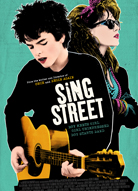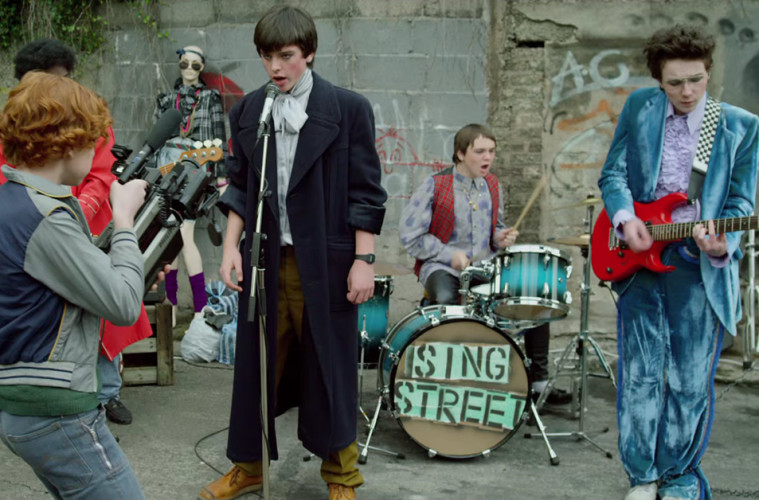 Like Begin Again, his last love song to the restorative powers of music and collaboration, John Carney can play your heartstrings like an orchestra. And like that film’s original title – Can A Song Save Your Life? – Sing Street addresses songwriting as soul food, with a face full of neon eyeliner and a deliciously poignant streak of youth in revolt. And as a young kid trying to forge a path in 1980s Dublin, there’s plenty to rebel against – institutional alcoholism and abuse, isolation from the mainland and mainstream, and the collapse of your elders’ hopes playing out in an endless depressive cycle. The future looks as bleak as the dark and stormy skies portending above the Irish shore, but it just so happens that these are the conditions where inspiration can strike like a lightning bolt. If you don’t like the only song playing on the radio, you’d better chuck it in the bin and dream up a new one.
Like Begin Again, his last love song to the restorative powers of music and collaboration, John Carney can play your heartstrings like an orchestra. And like that film’s original title – Can A Song Save Your Life? – Sing Street addresses songwriting as soul food, with a face full of neon eyeliner and a deliciously poignant streak of youth in revolt. And as a young kid trying to forge a path in 1980s Dublin, there’s plenty to rebel against – institutional alcoholism and abuse, isolation from the mainland and mainstream, and the collapse of your elders’ hopes playing out in an endless depressive cycle. The future looks as bleak as the dark and stormy skies portending above the Irish shore, but it just so happens that these are the conditions where inspiration can strike like a lightning bolt. If you don’t like the only song playing on the radio, you’d better chuck it in the bin and dream up a new one.
As the story so often goes, Conor (newcomer Ferdia Walsh-Peelo, the love child of Bud Cort and Harry Styles) starts a band with a ragtag uniform of Catholic schoolboys to impress a girl. He may not know it at first, but that’s not the only reason. More after the jump...

Harnessing self-expression to break free of his parents’ broken marriage, his oppressive headmaster, and the stifling sameness of his community that turns boys into brutes, the band becomes a rally cry of guerilla utopia. Guided by his sage, B-siding older brother Brenden (Jack Reynor) and a head bobbing soundtrack of The Cure and Duran Duran, the band cranks out a collage of DIY art, their canon of backyard music videos and future hits expanding alongside their new leases on life. Ditch the covers, Brenden advises, believe in your talent and make your own magic.
One of the primary delights in Sing Street is watching this group of doe-eyed dreamers shift their style with each new inspiration like their lives depend on it, reflected in a recurring motif of their wardrobes changing from poet blacks to cosmic Bowie concoctions over the course of week. The budding romance between Conor and Raphina (Lucy Boynton, a charismatic discovery) wraps you up in a “happy-sad” embrace of energetic optimism and the pain and heartbreak that comes when you open your heart. Late night powwows in Brenden's bedroom are clouded in hash smoke but rife with brotherly love. While a small handful of rote character beats feel out of key, they are immediately overpowered by the film’s definitively soaring notes of family bonds and big dreams that shatter and bind. It’s hard to outright reject the film’s earnest dreams of a better world when they’re so upliftingly connected to the fruits of love and labor.
Finding jubilation in devastation has always been one of Carney’s primary talents as a storyteller – eyes well at the mere thought of Glen Hansard and Marketa Irglova’s fog-lifting harmony in Once’s music store – but his facility as a filmmaker stands out here, as well. If he bit off more than he could chew in Begin Again, his eyes are still bigger than his plate in Sing Street but he manages to visually transcend his boundless romanticism into a reflective style. You know it’s a Carney picture the moment street musicians combine rough and tumble reality with perfect pitch on the sidewalk, but his camera finds new ways to express his excitement. In an unbroken shot that can’t contain its joy, Carney compresses time, space, and the entire songwriting process from genesis to full-bloom as he circles the band’s rehearsal room, each kid rocker appearing out of the ether to play their part.

Conor’s dreams for a music video play out in a fantasy sequence of a 1950s sock hop with the group as a prom band, where his parents are no longer divorcing but dancing to the beat, priests do backflips and his crush sneaks in through the side door, the community celebrates itself as it should be. When we snap back into reality, in a shell of that vision, we don’t just feel misery for things not working out; we cling onto that hope as a driving force. It may be Carney’s purest expression of that ideal, his own reason to go to the microphone.
The original songs are absolutely wonderful. Co-written by Carney, their infectious ebullience hooks you into a higher state of bliss. The falsettos of instant classic “Girls” stick in your head and you never want to them to leave, while “Drive It Like You Stole It” amps youthful anti-authority. Even the more silly titles like “The Riddle of the Model” generate infinite love for these kids and their committed expression. And when you consider the texture of their handmade music videos, shot with love on a camcorder, it’s hard not to think of Once’s humble immediacy and Carney’s roughhewn roots, as well. His gift is his song and, to everybody out there in the audience tonight with their head in the clouds and feet on the ground, this one’s for you.